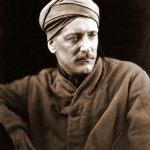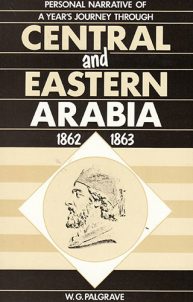William Gifford Palgrave
William Gifford Palgrave (1826-1888), a diplomat, linguist, and explorer, was a friend of Alfred, Lord Tennyson who often visited Freshwater. Educated at Oxford University, Palgrave travelled to India as a young man, where he converted to Roman Catholicism, was trained by the Jesuits in Madras, and became a priest. He later went on to work as a missionary in Syria, where he acquired a taste for Arab life. In 1865 Palgrave published his Narrative of a Year’s Journey through Central and Eastern Arabia (1862-1863), which recounts his journey from the Dead Sea to the Persian Gulf. The expedition was paid for by Napoleon III, who instructed him to report on the attitude of the Arab peoples toward France and the possibility of obtaining pure Arabian stallions for breeding in Europe. In making this journey, Palgrave was obliged to travel in disguise, passing as a Syrian Christian doctor and merchant, since the region was off-limits to European travellers at the time. His account describes the topography and geology in some detail and is notable for its charting of small towns and villages in remote desert areas. However, Palgrave’s comments on Arab society are notably colonialist in tone. He berates Islam as being responsible for the backward condition of Arabia and describes the Bedouins as false and brutal savages. The work was very popular and was translated into French and published in two editions in 1866 and 1869. After 1870 Palgrave was engaged in diplomatic work for the British government, which took him to Asia Minor, the West Indies, Thailand, and the Philippines. He also published travelogues on Dutch Guyana and Indonesia.



